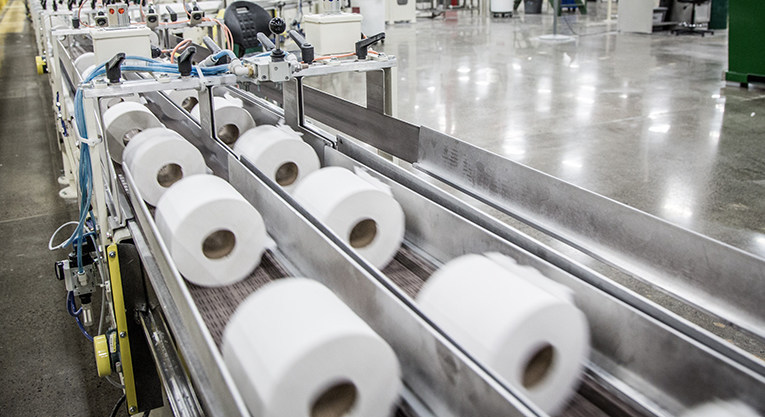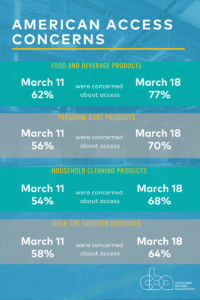
Blog
The Greatest Threat to Consumers’ Access to Essential Products
Empty store shelves and out-of-stock notices online have sent the message that there is a shortage of essentials, from cleaning supplies to personal care items to food and beverage staples. CPG manufacturers are working overtime to replenish retailers’ stock — depleted by severe overbuying — as quickly as possible by ramping up production and delivering goods from their ample supply.
 Right now, Americans are fearful of being able to get what they need. Consumer Brands Association’s weekly coronavirus survey showed that most Americans are concerned about access to these essential products. Nearly eight-in-ten (78%) Americans said they were concerned about access to food and beverage products, slightly more than those concerned about access to personal care products (70%), household cleaning products (68%) or over-the-counter medicines (64%). These numbers are all up significantly since last week’s survey.
Right now, Americans are fearful of being able to get what they need. Consumer Brands Association’s weekly coronavirus survey showed that most Americans are concerned about access to these essential products. Nearly eight-in-ten (78%) Americans said they were concerned about access to food and beverage products, slightly more than those concerned about access to personal care products (70%), household cleaning products (68%) or over-the-counter medicines (64%). These numbers are all up significantly since last week’s survey.
The biggest threat to their access to goods, however, isn’t a supply shortage — it’s decisions being made right now by their state and local governments.
Across America, states and communities are taking action to protect their citizens from the spread of the coronavirus. In their pursuit of stopping the spread of COVID-19, they have instituted travel restrictions, gathering limits and curfews. We respect the need for these measures and agree with their action. There are, however, exemptions that must be made in the interest of public health.
Right now, the production and delivery of essential products — the very products Americans are stocking up on to ensure they can stay in their homes and prevent the spread of COVID-19 — are not expeditiously or clearly exempted. The CPG industry supply chain must be allowed to produce and deliver goods, period.
We have heard from members that they have experienced issues with workers getting to manufacturing facilities and trucks of essential goods getting to their destinations. This can’t happen.
States and cities are scrambling and doing their best to protect public health. But they are risking the serious unintended consequence of inhibiting their citizens’ access to essential products, creating the conditions for the potential shortages Americans fear.
The American people near-universally understand the importance. Eighty-nine percent agree that the production and delivery of essential goods should be exempt from state and local curfews and gathering bans. Ninety-seven percent of Americans consider the workers producing and delivering high-demand goods as essential to fighting coronavirus.
At the federal level, there is also clear understanding of the need for CPG products to be exempted. The White House stated that, as makers of essential products, the industry is part of the “critical infrastructure” definition: “If you work in a critical infrastructure industry, as defined by the Department of Homeland Security, such as healthcare services and pharmaceutical and food supply, you have a special responsibility to maintain your normal work schedule. You and your employers should follow CDC guidance to protect your health at work.”
New York, which was early in establishing restrictions, has handled this issue well, allowing for the uninterrupted production and delivery of essential items. California Governor Gavin Newsom, who issued a shelter-in-place order yesterday, clarified that the state would follow the Department of Homeland Security’s guidance that identifies the CPG supply chain as critical infrastructure. It is important that every state and local jurisdiction follow suit.
Subjecting manufacturing facilities to gathering restrictions could halt the production of essential products. Manufacturing facilities are not areas of “public gathering,” rather heavily controlled environments that operate under strict safety requirements, exemplify good manufacturing practices and exercise rigorous hygienic protocols. Forcing the trucks carrying those products to abide by curfews or travel restrictions could keep them from getting to stores.
We can’t let that happen. Join us in our call on state and local governments to ensure Americans don’t lose access to essential products at a critical time.
From providing original research, industry guidance and cutting-edge insights, to advocating on Capitol Hill and shaping policy that will have an impact for years to come, we are committed to delivering for our industry during this crisis. Stay informed.
Published on March 20, 2020




